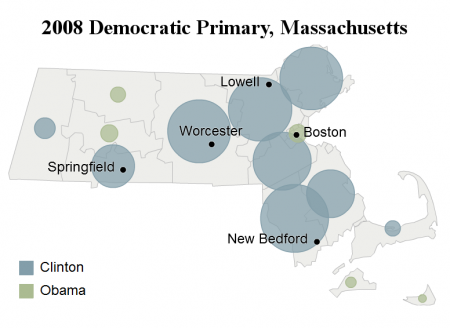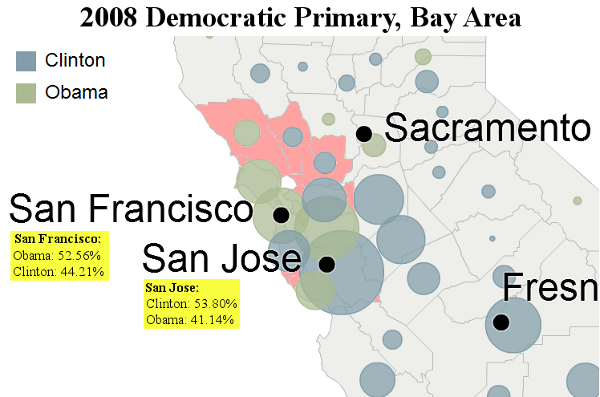By: Inoljt, http://mypolitikal.com/
I think we all remember the 2008 Democratic primaries, that exciting and epic battle. In many ways the campaign caused more excitement than the general election, whose result was never really in doubt (especially after the financial crisis).
Both candidates drew upon distinctly different coalitions. In an influential article, Ronald Brownstein analyzes the difference this way:
Since the 1960s, Democratic nominating contests regularly have come down to a struggle between a candidate who draws support primarily from upscale, economically comfortable voters liberal on social and foreign policy issues, and a rival who relies mostly on downscale, financially strained voters drawn to populist economics and somewhat more conservative views on cultural and national security issues.
President Barack Obama assembled a coalition from the former, these “wine-track” Democrats. When most Americans think of liberals, they think of wine-track Democrats. Mr. Obama, then, was the liberal candidate; Mrs. Clinton the “beer-track,” working-class representative.
So candidate won the most liberal place in America?
In fact, Secretary of State Hillary Clinton won the state of Massachusetts (you may have realized this by reading the title of this post). The result wasn’t even close; Mrs. Clinton’s margin was 15.37%.

These results are most strange. Barack Obama supposedly built a coalition upon liberal Democrats – yet he lost Massachusetts, the very image of liberalism. He then proceeded to win the nomination.
I will attempt to explain this puzzling result below.
There are several elements to it. Firstly, the state Massachusetts does not contain as many wine-track Democrats as most Americans tend to think. Rather, it includes a number of working-class, beer-track Democrats. These voters support Democrats based upon economic issues (which is not to say they are socially conservative). The state holds a strong union presence along with a high percentage of Catholics, numbering almost half the population. While in many places Catholics no longer vote Democratic, in Massachusetts they still are loyal to the party. According to exit polls, Catholics (45% of voters) went for Clinton by a 2-1 margin, while union households (27% of voters) supported Clinton 60-35.
Nevertheless, Clinton’s overwhelming victory remains surprising. Taking working-class support for Clinton into account, one still would expect Obama to do relatively well.
Remember, however, that this is Hillary Clinton we are talking about. Hillary Clinton, the champion of women’s rights. Hillary Clinton, the powerful and polarizing First Lady conservatives absolutely hated. Though the memory has dimmed, Hillary Clinton once stood at the forefront of “wine-track” liberalism. In February 5th, 2008 many liberal Democrats still remembered Hillary the feminist. Only later did Hillary the working-class fighter emerge.
Moreover, at that time Barack Obama continued to be a relative unknown, a bolt of lightning who had come out of nowhere. Hillary Clinton, therefore, made substantial inroads into Obama’s coalition, just as Obama took away a central pillar of working-class Democrats (blacks). Exit polls indicated that 62% of women supported Clinton (36% supported Obama); progressive white women probably went for her even more strongly. Throughout the primaries, Jews and gays (both deeply liberal groups) tended to support Clinton.
I am not terribly satisfied with this analysis; it does not seem to fully explain how the most liberal state in the union supported the more conservative candidate. The result perplexes me even today.
Nor did Massachusetts constitute an anomaly; Clinton did well in other liberal areas. She and Obama, for instance essentially tied the San Francisco Bay Area:

Reasonable explanations behind this result also exist. Working-class Latinos gave Clinton strong support; thus her large margins in heavily Latino San Jose and Fresno. Moreover, upper-class Asians – a major Bay Area constituency – supported her 3-1.
Yet the fact remains that, out of the two most liberal regions in the nation, Hillary Clinton won a landslide in one and tied another (if one adds together the Bay Area’s nine metropolitan counties, Obama actually wins by 1.2%). All this against an opponent whose base lay amongst liberal Democrats. It is all very puzzling.
Note: All images are modified pictures taken from the NYT.
It’s heavily Catholic, just like Rhode Island (which is also where Clinton did well).
California is probably better explained by the early voting system (Clinton banked a lot of votes early on) and, as you’ve already mentioned, the strong Latino and Asian populations in the Bay area.
Neither result is particularly surprising
probably had a regional effect in the North East. Early voting was heavily in favor of Clinton and the fact that she was the establishment candidate.
Obama really didn’t contest a lot of the Super Tuesday primaries as much in states that Clinton was ahead, other than California and Massachusetts at the very end which is when he was gaining momentum.
Primary momentum didn’t shift till after Super Tuesday when Obama won all those primaries and caucuses in a row. Why? Because he had the grassroots organization that was excellent at working caucuses and individual primaries.
It shouldn’t be too surprising that Clinton won Massachusetts.
liked Hillary Clinton.
It was also Hope for change vs. Experience of street fighting. Obama brought in new voters, Clinton got a lot of support from those looking back in anger (although she obviously struggled with those who thought Bill should have achieved more).
And that’s even before we get in to demographic groups.
Patrick and Obama ran very similar campaigns (they had the same manager). Even by 2008, Patrick’s approval ratings were way off, so I think a lot of Massachusetts voters responded rather coolly to Obama’s message and had something of a “yeah, yeah, we’ve heard that before attitude.” This may also explain why his numbers in Massachusetts barely budge vis a vis 2004 and 2000, though the native son effect for Kerry might have had more to do with that.
that Hillary was the “more conservative candidate.” On health care, for example, Clinton and Edwards were both significantly to the left of Obama.
I lived there in the 70s, during the busing controversy. In 1978 a very conservative Democrat, Ed King, beat Dukakis in the primary. Massachusetts is not as liberal as Vermont, Washington, Oregon, or Minnesota, though it is probably more Democratic.
It had very little to do with their actual positions on actual issues. It’s very fitting that a guy from Massachusetts came up with the nostrum “all politics is local.”
And it’s not racism either.
Nearly every contested Democratic primary for any office anywhere in Massachusetts in the last 40 years or so has come down either uniting or dividing two groups of voters – the “Back Bay” faction and the “Southie” faction. “Liberal vs. conservative” (both sides are pretty liberal, though both can flirt with a few conservative positions from time to time) doesn’t capture this factionalism, and even “white collar v. blue collar” doesn’t quite get you there.
The former camp are big believers in reformist candidates and “good government” initiatives and those latter camp are generally skpetical of (if not necessarily hostile to) both.
Many in the latter camp are pro-life and/or uncomfortable with same-sex marriage. The former are essentially universally pro-choice and and at this point mostly favor same-sex marriage rights too. (Both sides are divided on capital punishment.)
The latter camp are traditionally Catholic white ethnics (Irish especially, but also Italian, Polish, or French-Canadian.) The former have their roots in Progressive Era Republican mainline Protestantism but augmented by the state’s Jewish community.
Places where the latter camp tends to hold sway would include most of Boston proper, Worcester, the South Coast, the Blackstone Valley, the Merrimack Valley, and Springfield. Places associated with the former camp would include Cambridge/Brookline/Newton, Metro West, and the Five Colleges (Amherst, NoHo) area.
At times it’s about identity, almost like picking sports teams. There are so many races on these ballots sometimes that you can’t make sense of who’s got what positions on some specific issue. Since Bush and Romney between them trashed the GOP brand in the Bay State so badly, the Republican party doesn’t work as a functional opposition or as thing to contrast oneself to. So there’s a tendency to boil things down to which faction of politicians are endorsing them or what town or neighborhood they’re from as a way to figure out which side they’re going to come down upon. And I think Bay State voters ended up doing this with regards to Presidential candidates as well.
Why Clinton won boils down to this:
1. Her operation locked down most of the mid-level endorsements that matter in local communities – mayors, legislators, House members, union leaders, city political operatives – in the state. Even several people – Jim McGovern and Mike Capuano to name two – who seemed like they’d be natural Obama allies. Sure, Ted Kennedy, John Kerry, and Deval Patrick endorsed Obama; they’re all big names, but the on-the-ground locals carry more clout in most primaries than those big names do. Every Southie-type pol came out for HRC and those endorsements mean a lot to many voters.
2. Obama wasn’t able to unify the rest of the Democratic electorate. Jewish voters (MA and almost everywhere else) tended to go for HRC over BHO, and a Democrat running as the “reformist” faction candidate in the Bay State needs that vote. The sizable Hispanic electorate has not really weighed in too strongly on either side of this internecine battle, but that election they went for HRC too (as a Senator from NY, she made big inroads with the Puerto Rican community, which is the biggest share of Hispanics in both NY and MA.)
You can see a lot of this by looking at town-by-town results and even that simple map above tells you a little. Obama won 5 counties:
Suffolk County (basically Boston and little else) has a large African-American population. Hampshire and Franklin Counties are essentially, this is the above-mentioned Five College towns and their spinoff communities. Most other towns in those counties are very small. Martha’s Vineyard and Nantucket have bout 25K year-round residents between them; they skew heavily liberal.
The other nine went for HRC – some, like Berkshire (which at this point is basically an extension of Vermont) narrowly and some like Worcester County (land of the lunchpail “Reagan Dems” in the 1980s), strongly.